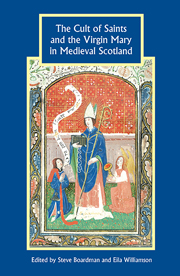Book contents
- Frontmatter
- Contents
- List of Illustrations and Tables
- List of Contributors
- Abbreviations
- Introduction
- 1 The Big Man, the Footsteps, and the Fissile Saint: paradigms and problems in studies of insular saints' cults
- 2 St Munnu in Ireland and Scotland: an exploration of his cult
- 3 The struggle for sanctity: St Waltheof of Melrose, Cistercian in-house cults and canonisation procedure at the turn of the thirteenth century
- 4 Royal and aristocratic attitudes to saints and the Virgin Mary in twelfth- and thirteenth-century Scotland
- 5 A saintly sinner? The ‘martyrdom’ of David, duke of Rothesay
- 6 Wo/men only? Marian devotion in medieval Perth
- 7 Is eagal liom lá na hagra: devotion to the Virgin in the later medieval Gàidhealtachd
- 8 Scottish saints' legends in the Aberdeen Breviary
- 9 Mothers and their sons: Mary and Jesus in Scotland, 1450–1560
- 10 The ‘McRoberts thesis’ and patterns of sanctity in late medieval Scotland
- Index
7 - Is eagal liom lá na hagra: devotion to the Virgin in the later medieval Gàidhealtachd
Published online by Cambridge University Press: 05 October 2013
- Frontmatter
- Contents
- List of Illustrations and Tables
- List of Contributors
- Abbreviations
- Introduction
- 1 The Big Man, the Footsteps, and the Fissile Saint: paradigms and problems in studies of insular saints' cults
- 2 St Munnu in Ireland and Scotland: an exploration of his cult
- 3 The struggle for sanctity: St Waltheof of Melrose, Cistercian in-house cults and canonisation procedure at the turn of the thirteenth century
- 4 Royal and aristocratic attitudes to saints and the Virgin Mary in twelfth- and thirteenth-century Scotland
- 5 A saintly sinner? The ‘martyrdom’ of David, duke of Rothesay
- 6 Wo/men only? Marian devotion in medieval Perth
- 7 Is eagal liom lá na hagra: devotion to the Virgin in the later medieval Gàidhealtachd
- 8 Scottish saints' legends in the Aberdeen Breviary
- 9 Mothers and their sons: Mary and Jesus in Scotland, 1450–1560
- 10 The ‘McRoberts thesis’ and patterns of sanctity in late medieval Scotland
- Index
Summary
The later medieval Scottish poet Maol-Domhnaigh mac Mhághnais Mhuileadhaigh (Maol-Domhnaigh son of Magnus of Mull), in his poem Ná léig mo mhealladh, a Mhuire (Do not allow me to be deceived, O Mary), addresses the Blessed Virgin Mary in the hope that she will intervene with God on Judgement Day to save his soul:
Is eagal liom lá na hagra,
a inghean Anna an fhoilt tais;
i n-aghaidh Dé ní fhoil aighneas,
goir mé óm aimhleas ar m'ais.
(I fear the day of accusation, O daughter of Anne of the soft hair; recall me from harm since there is no pleading against God.)
This chapter seeks to introduce some of the material which can be used to gain an understanding of devotion to the Virgin in the later medieval Gàidhealtachd. The Virgin is crucial to any study of christian piety and devotion in the later middle ages. How then was she conceptualised by the Gaels of Scotland during that period? We will begin with an introductory survey of some of the available material, before concentrating on Gaelic poetry which focuses on the Virgin and miracles performed by her for her devotees. Miracle tales including the Virgin are often seen as ‘excessive’ and scholarly reaction to medieval Marian miracles is very mixed. It will also be shown how this debate is relevant to the Gaelic material.
- Type
- Chapter
- Information
- The Cult of Saints and the Virgin Mary in Medieval Scotland , pp. 125 - 142Publisher: Boydell & BrewerPrint publication year: 2010

